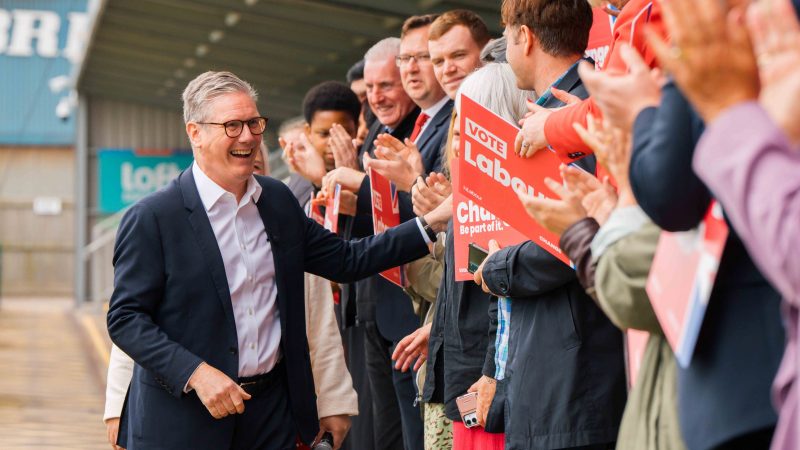
It is no secret that Labour relied heavily on tactical voting for its 2024 landslide victory.
The party was able to double its seat share with only a 1.6 point increase in its vote share compared to 2019.
Indeed, a report by Compass last December found that nearly half of Labour voters who backed the party in the election were weak or tactical voters – one of the reasons why Labour has been struggling in national polling ever since.
As Owen Jones calls for a Corbyn-Sultana and Green Party alliance, the question on many Labour figures’ lips is whether the party can continue to rely on tactical voting, or whether it also needs to consider an electoral pact with other progressive parties.
Progressive tragedies
Neal Lawson, director of Compass, makes the case that Labour has stood aside in the past to help defeat the right.
In 1997, Labour and the Lib Dems withdrew their candidates in Tatton in favour of independent candidate Martin Bell. The move led to Bell’s victory in what had been one of the safest Conservative seats in the country.
“That Labour has to stand a candidate in every constituency as a rule is not true.” he told LabourList.
Compass has campaigned in the past for local parties to be able to decide whether or not to run a candidate, known as Stand To Win.
This would prevent progressive parties from splitting the vote, and letting a right wing party win.
Lawson calls these seats “progressive tragedies”.
However, at the last election, there were far more “regressive tragedies” than progressive ones, seats where a right wing party would have won had the Tories and Reform not split the vote – 202 in total.
Although the likelihood of the Tories and Reform entering into a formal electoral pact seems unlikely, even a soft pact could be devastating for the left, particularly one that has been bitterly divided over issues like welfare reform and Gaza.
Lawson warned: “Will voters on the left hold their noses next time? That’s a massive question.”
For now, however, Labour appears to remain unconvinced about electoral pacts.
Infinitesimally small
A Labour source said the chance of the party entering into a formal pact was “infinitesimally small”.
They pointed to Labour’s history as a warning of what happens when a bigger party enters into a formal pact with a smaller one.
“We owe our existence in Parliament to a formal pact to only stand in certain seats with the Liberals. But clearly there’s a warning there, the big party actually ended up getting eaten by the small party that it did a deal with – the small party being us.
“And then the other time in history that we’ve done it still exists, and that is the agreement that we have with the Cooperative Party.”
However, they said tactical voting – and targeted campaigning – remained a way by which progressive parties could effectively have an informal pact with one another.
“You had a sort of de facto, tacit, agreement between the Lib Dems and Labour in 2024, because you basically had loads of tactical voting – and what I would describe as targeted campaigning – because parties don’t have the resources to run a full on campaign absolutely everywhere, so they targeted resources.
“Almost the entire time we were not targeting the same seats as the Lib Dems.”
Subscribe here to our daily newsletter roundup of all things Labour – and follow us on Bluesky, WhatsApp, Threads, X or Facebook.
Asked about past party members who have been suspended or expelled after endorsing another party, they said: The whole point of a party is just a collective group of people that are campaigning for each other.
“How would you feel if you were the candidate in that seat and you discovered that one of your local members hadn’t even voted for you? Or campaigned for someone else against you?
“Any member of the public can do what they want. But when you join a political party, you’re accepting that you’re part of a collective that does things collectively.”
- SHARE: If you have anything to share that we should be looking into or publishing about this story – or any other topic involving Labour– contact us (strictly anonymously if you wish) at [email protected].
- SUBSCRIBE: Sign up to LabourList’s morning email here for the best briefing on everything Labour, every weekday morning.
- DONATE: If you value our work, please chip in a few pounds a week and become one of our supporters, helping sustain and expand our coverage.
- PARTNER: If you or your organisation might be interested in partnering with us on sponsored events or projects, email [email protected].
- ADVERTISE: If your organisation would like to advertise or run sponsored pieces on LabourList‘s daily newsletter or website, contact our exclusive ad partners Total Politics at [email protected].




More from LabourList
Ashley Dalton resigns as health minister for cancer treatment
Paul Nowak column: ‘Labour must focus on the basics’
‘Labour’s two-child cap victory rings hollow while asylum-seeking children remain in poverty’